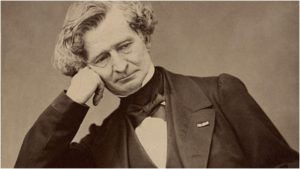
A Survey of Berlioz’s Operas
By David SalazarHector Berlioz has always stood as a controversial figure in the world of classical music. Born on Dec. 11, 1803, his legacy has been one of confusion for many artists. On one hand, he is seen as an incredible genius, whose music is among the richest ever written, his orchestration revolutionary. Others find his music ambiguous in quality, with only a few moments of genius rising amidst a muddled ocean of harmony and rhythm.
There are some works of his that are indisputable masterpieces, including the “Symphonie Fantastique” and “Roméo et Juliette.” His operatic output is well-received, for the most part, but not necessarily a consistent staple of the modern opera house. That trend is starting to shift a bit for some of his major works, though in sum, Berlioz only wrote five operas. Here Is a survey of his works.
Les Francs-Juges
The composer’s early work was largely unfinished. It is in medieval times and was aimed at being in the style of Cherubini and Méhul. The composer never got a chance to finish it and while he made several attempts to revise it, only five numbers from the original 1826 score exist. He did turn the overture into a concert piece that gets performed more regularly.
Benvenuto Cellini
This work is “officially” Berlioz’s first opera, as it had its world premiere in 1838. Relating a fictional account of the famed artist Benvenutto Cellini, the work is a massive challenge for the tenor who attempts the title role. For this reason, it remains a rarity in the repertoire.
La Damnation de Faust
While not really an “opera” in the purest form, this hybrid of a cantata-opera has been treated largely as a stageable dramatic work in recent years. It’s themes no doubt make it a popular work for directors, as does its relatively small cast. The work had its first performance in 1846.
Béatrice et Bénédict
The composer’s penultimate opera is based on Shakespeare’s “Much Ado about Nothing.” He started this opera prior to “Les Troyens,” but actually finished it after this famous masterwork, its world premiere coming in 1862. It has garnered consistent performances over the years, though it has failed to become a repertory staple.
Les Troyens
The composer’s final, and arguably greatest, opera is the one that has held the stage and recording studios throughout history. Massive in scale, Les Troyens is nonetheless the most structurally cohesive of the composer’s massive operas, its music refined and polished in a way that few have complained about, especially in comparison to other Berlioz works. British critic W.J. Turner audaciously called it “the greatest opera ever written.” Hugh Macdonald added, “In the history of French music, ’Les Troyens’ stands out as a grand opera that avoided the shallow glamour of Meyerbeer and Halévy, but therefore paid the price of long neglect. In our own time the opera has finally come to be seen as one of the greatest operas of the 19th century.”


